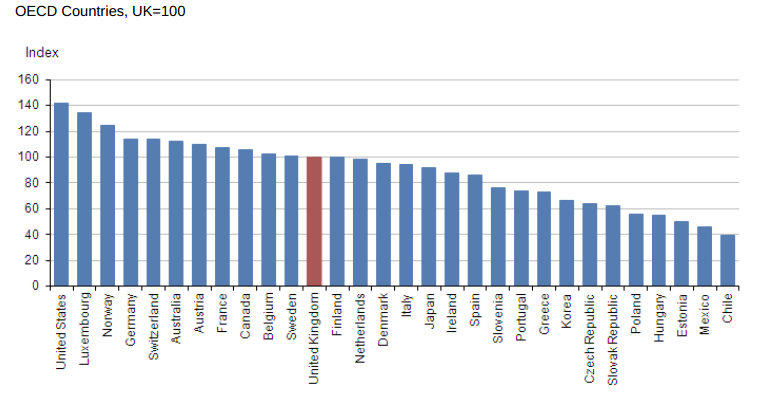Skift Take
More disposable income usually translates into more travel and leisure, and you can see the woes of Europea crisis reflected in these rankings. This is already affecting domestic European leisure travel and will continue to short to medium term.
The UK has plunged down an economic wellbeing league, falling from fifth place to 12th over six years, according to a new report that underlines the pressure on Britons’ finances amid rising unemployment.
The Office for National Statistics ranked OECD countries in terms of disposable household income from 2005 to 2011, but on a separate ONS labour-market ranking Britain dropped even further, falling 12 places over the six years.
The ONS looked at various economic factors that might affect wellbeing across the OECD club of mostly rich nations as part of its scheme to measure national wellbeing. It ranked the United States top in terms of disposable household income, followed by Luxembourg. Chile was ranked bottom out of 30 countries.
Statisticians said part of the UK’s drop down the disposable household income table was due to the devaluation of the pound, which raised the price of goods and services in the UK relative to other countries. But the ONS also noted other factors including changes to taxes and benefits.
“Over the course of the recession, as unemployment rose, people paid less in taxes and claimed more benefits – causing less of a strain on household income. However, as the economy emerged from the first period of contraction (measured by GDP), households began to feel the squeeze on their incomes as these effects wore off,” the ONS said.
Opponents of the government’s austerity drive seized on the apparent deterioration in UK household finances. The Trades Union Congress said the squeeze on incomes reflected slow wage growth, currently running at little more than 1% on average, compared with inflation of 2.8% at the latest count.
“The combination of recession and austerity has taken its toll on household finances, with income levels in the UK falling behind many of its European neighbours,” said TUC general secretary Frances O’Grady.
“Even before the recession, household spending in the UK was far more reliant on debt than in other advanced economies. In order to address this as a country we need to obsess less about housing bubbles and focus instead on securing decent pay rises and creating better paid jobs.”
The ONS report also looked at spending and wealth and said the UK remained “relatively strong” compared with other OECD countries on those measures.
It was on unemployment that the UK suffered the most dramatic drop in the international rankings. However, the ONS noted the “UK labour market has been more resilient than in previous recessions” in that employment did not fall as far and unemployment did not rise as much.
With the unemployment rate at 8% in 2011, the UK was more than halfway down the labour market league table. It ranked 21 out of 34 countries. That ranking was down 12 places from 2005.
Norway was top of the league with unemployment at just 3% and Spain was bottom at 21.6%.
The UK had one of the biggest drops over the six years although the US suffered similarly, down 13 places to 25th.
The ONS put the shakeup in the labour market rankings down to the nature of the recession.
“Many of the countries that have overtaken the UK and US in the rankings are smaller economies, less exposed to the 2008 downturn, which centred on the US and Europe. The fall of 12 places in the international rankings for the UK has therefore come despite historically the most stable labour market seen in a UK recession,” it said.
Household Actual Disposable Income
1. United States
2. Luxembourg
3. Norway
4. Germany
5. Switzerland
6. Australia
7. Austria
8. France
9. Canada
10. Belgium
11. Sweden
12. United Kingdom
13. Finland
14. Netherlands
15. Denmark
This article originally appeared on guardian.co.uk![]()
The Daily Newsletter
Our daily coverage of the global travel industry. Written by editors and analysts from across Skift’s brands.
Have a confidential tip for Skift? Get in touch
Photo credit: Household actual disposable income per head in 2011 among developed countries
